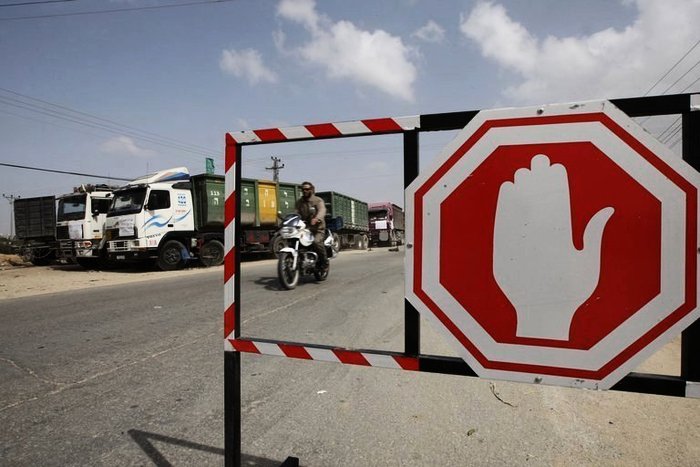
Ref: 46/2015

The Palestinian Centre for Human Rights has published a new report as part of monthly Gaza Strip border crossings reports’ series addressing the latest developments in the state of Gaza Strip’s border crossings in June and July 2015. The report documents the impact of the ongoing Israeli siege on the Palestinian civilians, and it confirms that this closure affects their development and reconstruction process and this is the main
reason behind the deterioration of their economic and social conditions. The report also refutes Israel’s claims that it has eased the closure of the Gaza Strip which has been imposed for the ninth consecutive year. In addition, it confirms that the continuing Israeli measures aim to institutionalize the closure and make it acceptable at the international level although it violates international law, including the international humanitarian law and human rights law.
According to the report, no remarkable change was witnessed on the commercial movement in June and July, and Israel continued to impose a complete ban on the exportation from Gaza Strip to the West bank, Israel and abroad. Exceptionally, Israel allowed exportation of 186 truckloads to the West bank, 155 of them of agriculture products (tomatoes, cucumber, chili pepper, paprika, garlic, aborigine, zucchini, mints), 12 of them of furniture, 9 of them of stationery, 5 of them of fish, and 5 of them of clothes.
Concerning the imports, there were more obstacles imposed on importing the main products, especially construction materials which are needed for Gaza reconstruction process and infrastructure project. Israeli forces allowed importation of 16,925 truckloads, the majority of which were foodstuffs and consumables with an average of 277 truckloads daily. The number of the truckloads that were allowed in represents 48.5% of the number of the truckloads that were allowed in before imposing the closure which were 570 truckloads daily, given that the Gaza Strip needs highly increased because of the population increase. It should be noted that Karm Abu Salem, which is the only commercial crossing in the Gaza Strip, was closed within the reporting period for 19 days (31% of the total reporting period).
As for the movement of persons, civilians have been denied their right to the freedom of movement and have suffered due to the obstacles imposed on their movement at all border crossings which connect Gaza Strip with the outside world, Israel, and the West bank.
In June and July, Israel continued to impose severe restrictions on the movement of Palestinians via Beit Hanoun crossing (Eriz), which is the only crossing between Gaza Strip and the West bank, including occupied Jerusalem and/or Israel. As a result, 1.8 million person were deprived of their right to move and travel. In spite of the increasing the number of Palestinians who are allowed to travel via Beit Hanoun crossing within the reporting period compared to the complete ban months ago, the categories who are allowed to travel via Beit Hanoun are limited and no change. The limited categories are: 2,946 patients accompanied by 2,840 persons, 20,834 businessmen, 6,115 persons of personal needs, 1,573 workers of international humanitarian organizations, 296 persons travel via Allenby bridge, 416 relatives of prisoners in Israeli jails, and 3.081 (elderly persons) to pray in al-Aqsa Mosque. All these categories travel via the crossing under very complicated procedures. Moreover, Israeli forces continued to use Beit Hanoun crossing (Eriz) as a trap to blackmail and arrest the Palestinians. In this context, they arrested a patient, during the reporting period, while travelling via Beit hanoun crossing.
Rafah crossing point was closed during the reporting period for 51 days due to the Egyptian internal crisis, and the deterioration of the security conditions North Sinai. But it was opened for only 10 days when 4,968 civilians could depart the Gaza Strip, 1,444 civilians could to return, and the Egyptian authorities refused 238 civilians. The number of people who were in a desperate need to travel and registered in the Ministry
of interior 16,000 persons, not including people who want to travel but not registered in the Ministry of Interior.
In the report’s recommendations, PCHR calls upon the international community, especially the High Contracting Parties to the Fourth Geneva Convention 1949, to immediately intervene to force Israeli authorities to open all border crossings to stop the humanitarian deterioration in the Gaza Strip.
… [Trackback]
[…] Info on that Topic: pchrgaza.org/pchr-publishes-new-report-covering-june-and-july-2015-period-as-part-of-state-of-the-gaza-strips-border-crossings-report-series/ […]